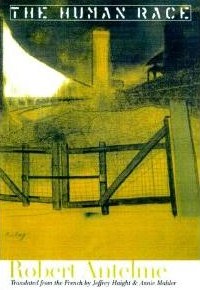Robert Antelme
The Human Race

-Estas son las memorias de un judío en un campo de concentración nazi durante la II Guerra Mundial
"Weg! -get the hell out of the way! -he said to me in a rasping voice. I shrugged it off ... but I still existed, and I shrugged it off ... the insults of these people are no more able to reach us than they are able to get their hands on the nightmare we have become in their brains: for all their denying of us we are still there." (p. 51)
These victimizers could have lived next to you, could have walked by you any given day on the streets: "Sometimes the SS man laughs and jokes with the doctor. And yet, before he was given the job, the SS used to beat him. But now he wears a white coat; he sleeps in a small heated room; he doesn't have to go to roll call; and he eats, and he's pink ... the Spanish doctor rapidly turned into a particularly good example of the kommando's aristocracy."
It's a hard read because of its sadness, hellish misery, absence of what well-intentioned people call humanity but is nothing but sin and evil. The author cries his soul out, pours his deepest self in words of sorrow and anguish, in pages that seek comprehension, but from whom? The author does not say. If it´s from his readers, no help can be given him now.
This is the best account of the experiences of a man in a nazi prison camp during the European Holocaust. Buch better than the popular Primo Levi book. This is a deep, slow-paced, intellectual, thinking-man's guide to survival in Holocaust Europe. There are detailed descriptions of ways of feeling, of sentiments and relationships that are tacit, hard to describe, and which the author in his characteristic French style achieves perfectly.
I strongly recommend to read this book, with a little patience. It takes its time to get into it fully, to grasp the implications and all the meaning of what's going on physically -but especially- psychologically. The book is not spiritual, because there's no spiritual faith. But if humanity is not enough to account for the gravity of the things told here, then who or what are we to appeal to? If we trust in man alone, and man does these kind of things, then who are we to appeal to? It would be an useless exercise of intellect, a waste of time spent just pretending to be something called Human.
